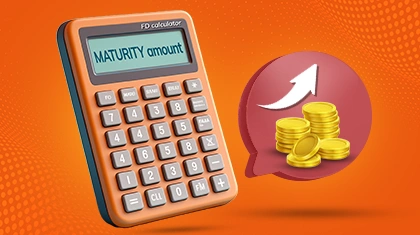THE
ORANGE
HUB
How FD Worked for You and Your Parents - Complete Guide

Most of us have grown up seeing our parents invest their surplus money into a Fixed Deposit account. Today, however, we seem to be bombarded with options: trading in stocks or investing in a Mutual Fund scheme is a commonplace financial practice. The result of having this huge variety of investment options is that Fixed Deposit now appears to be old school.
We might be tempted to dismiss them as an investment tool preferred only by our parents or conservative investors who are willing to take no risk. We may be tempted to invest in Equity Funds and experience the rush of trading in stocks, with the possibility of higher returns, but it would not be a financially wise decision to write off FDs completely. A Fixed Deposit can play an important part in your financial portfolio. Here’s why:
The need for an Emergency Fund
Any robust financial portfolio will make space for a rainy day fund, i.e. a fund that could potentially be drawn from in case of an emergency. Such emergencies could be anything from a major repair or revamp to the loss of a job. The idea is that you should be able to stay financially steady till you find a new job or at least not have to borrow money for a timely event.
If you are a good financial planner, you will create a corpus for emergency funds. This corpus needs to have two features. One, it should be a safe investment avenue. Second, it should be liquid.
You should be able to withdraw funds from it at a short notice when any emergency strikes. Having a Fixed Deposit account ensures that you have a readily available corpus that also earns interest.
Investment avenue to meet short-term goals
Across one’s lifetime, we establish a variety of short-term goals, whether it is the purchase of an automobile like a car or a bike, or saving up for a vacation or saving up for a home refurbishment. The idea is simple: you need a corpus which is liquid enough to align with the timelines of your specific need, and one that also earns interest while the money sits in a Fixed Deposit account as well as remains a safe harbour for your funds.
For most taxpayers, the income tax implications of a Fixed Deposit account are favourable
Most millennials are entering the workforce or have been in the workforce for less than a decade. The majority are, therefore, taxpayers who fall under the 10% or 20% bracket. It is interesting to note the post-tax returns for these groups. If a Fixed Deposit pays 5.5% interest for a year, what does this imply? If you are in the 10% tax bracket, the post-tax return on Fixed Deposit is 4.95%. Whereas for someone with a bigger package in the 30% tax bracket, the return is 3.85%, which is far lower.
Asset allocation
If you are a proactive investor who invests in a planned manner, you will have a specific allocation for a fixed income as well. When you are about to reach your financial goals, you should be taking lower risks. This means that you are advised to move away from the volatility of the market offered through Equity or Mutual Funds. This is where a Fixed Deposit account can help rebalance your asset portfolio, especially if you fall in the lower income tax brackets.
Further, if you are actively investing in the stock market, you might end up disturbing the asset allocation, so opening a Fixed Deposit account will help rebalance the asset portfolio.
Effective management of risk in the portfolio
At a very fundamental level, the funds you invest in a Fixed Deposit are safe from any kind of credit risk or interest rate risks. Therefore, Fixed Deposit makes a lot of sense when it comes to the management of risk in the portfolio. This principle is even true if you are already taking risks through other investments and want to have an element of risk-free return as well.
Thus, Fixed Deposit accounts are not yet outdated or outmoded as an investment avenue. The thrill of investing in the market and earning higher returns is a great exercise for the financial health of a portfolio, but the risks need to be balanced out with safer investments too.
T&C
For disclaimer, Click Here.
Scroll to top



